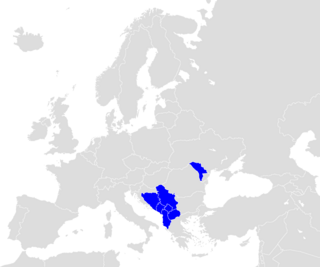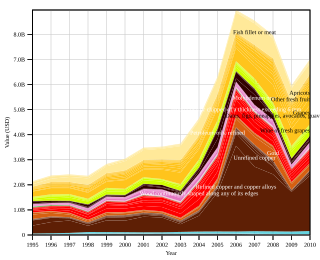
The Free Trade Area of the Americas (FTAA) was a proposed agreement to eliminate or reduce the trade barriers among all countries in the Americas, excluding Cuba. Negotiations to establish the FTAA ended in failure, however, with all parties unable to reach an agreement by the 2005 deadline they had set for themselves.

The Andean Community is a free trade area with the objective of creating a customs union comprising the South American countries of Bolivia, Colombia, Ecuador, and Peru. The trade bloc was called the Andean Pact until 1996 and came into existence when the Cartagena Agreement was signed in 1969. Its headquarters are in Lima, Peru.

The Central European Free Trade Agreement (CEFTA) is an international trade agreement between countries mostly located in Southeastern Europe. Founded by representatives of Poland, Hungary and Czechoslovakia, CEFTA in 2006 expanded to Albania, Bosnia and Herzegovina, Bulgaria, Croatia, Moldova, Montenegro, North Macedonia, Romania, Serbia, Slovenia and the UNMIK.
A European Union Association Agreement or simply Association Agreement (AA) is a treaty between the European Union (EU), its Member States and a non-EU country that creates a framework for co-operation between them. Areas frequently covered by such agreements include the development of political, trade, social, cultural and security links.
A free-trade agreement (FTA) or treaty is an agreement according to international law to form a free-trade area between the cooperating states. There are two types of trade agreements: bilateral and multilateral. Bilateral trade agreements occur when two countries agree to loosen trade restrictions between the two of them, generally to expand business opportunities. Multilateral trade agreements are agreements among three or more countries, and are the most difficult to negotiate and agree.
The US-Morocco Free Trade Agreement is a bilateral trade agreement between the United States and Morocco. The agreement was signed on June 15, 2004, followed by U.S. President George W. Bush's signing of the USMFTA Implementation Act on August 17, 2004. The United States House of Representatives ratified the pact on July 22, 2004 by a 323–99 vote. The United States Senate passed the bill by unanimous consent on July 21, 2004. The Morocco FTA came into effect on January 1, 2006.
The United States–Israel States Free Trade Agreement (FTA) is a trade pact between the State of Israel and the United States of America established in 1985 to lower trade barriers in some goods. The agreement reduces rates of duty, and in some case eliminates all duties, on merchandise exported from Israel to the United States. The agreement also covers merchandise exported from the Gaza Strip and the West Bank.

Chile–Mexico Free Trade Agreement is a trade agreement between Chile and Mexico. It was signed in Santiago, Chile on April 17, 1998. The agreement came into effect on 1 August 1999. This treaty marked the first of its kind for Mexico and second for Chile, after their agreement with Canada. The goals of the agreement are to stimulate expansion and diversity of trade, eliminate barriers to trade, promote fair competition, increase investment opportunity, protect and enforce intellectual property rights, establish guidelines for further cooperations, and create procedures for the application and enforcement of the treaty.

New Zealand is party to several free trade agreements (FTAs) worldwide.

A commercial policy is a government's policy governing international trade. Commercial policy is an all encompassing term that is used to cover topics which involve international trade. Trade policy is often described in terms of a scale between the extremes of free trade on one side and protectionism on the other. A common commercial policy can sometimes be agreed by treaty within a customs union, as with the European Union's common commercial policy and in Mercosur. A nation's commercial policy will include and take into account the policies adopted by that nation's government while negotiating international trade. There are several factors that can affect a nation's commercial policy, all of which can affect international trade policies.

The European Union has concluded free trade agreements (FTAs) and other agreements with a trade component with many countries worldwide and is negotiating with many others. The European Union negotiates free trade deals on behalf of all of its member states, as the member states have granted the EU has an "exclusive competence" to conclude trade agreements. Even so, member states' governments control every step of the process :

The United States-Chile Free Trade Agreement is a free trade agreement (FTA) between the United States and Chile signed on June 6, 2003. The pact came into force on January 1, 2004. On that date, tariffs on 90% of U.S. exports to Chile and 95% of Chilean exports to the United States were eliminated. The agreement also established that Chile and the U.S. will establish duty-free trade in all products within a maximum of 12 years (2016). In 2009, bilateral trade between the United States and Chile reached US$15.4 billion, a 141% increase over bilateral trade levels before the U.S.-Chile FTA took effect. In particular, U.S. exports to Chile in 2009 showed a 248% increase over pre-FTA levels.

The free trade agreements of Canada represents Canada's cooperation in multinational trade pacts and plays a large role in the Canadian economy. Canada is regularly described as a trading nation, considering its total trade is worth more than two-thirds of its GDP. Of that total trade, roughly 75% is done with countries that are part of free trade agreements with Canada—primarily the United States through the Canada–United States–Mexico Agreement (CUSMA), and its predecessor the North American Free Trade Agreement (NAFTA). By the end of 2014, Canadas bilateral trade hit Can$1 trillion for the first time. Canada is a signatory to 15 free trade agreements with 51 different countries.

The Korea–Australia Free Trade Agreement (KAFTA) is a bilateral agreement seeking to reduce trade and investment barriers between Australia and South Korea. The agreement, which came into effect on the 12th of December 2014 provides Australian goods exporters, service providers and investors with significantly improved access to the South Korean market. The trade agreement stems from decades of bilateral relations, encompassing security, trade and diplomatic ties from 1962, when then President Park Chung-Hee introduced a series of five-year plans designed to spur globalisation efforts and industrial development in Korea following the end of the Korean War.

The United Kingdom–United States Free Trade Agreement (UKUSFTA) is a proposed free trade agreement between the United Kingdom and the United States.
South Korea has concluded free trade agreements (FTAs) and other agreements with a trade component with countries around the world and is negotiating with others.
India is party to free trade agreements (FTAs) and other trade agreements with many countries and trade blocs, and is negotiating with many others. As of 2022, India has preferential access, economic cooperation and FTA with more than 50 individual countries.
Vietnam, although a relatively young and small nation, has successfully established trade relations with dozens of countries worldwide. This is especially evident in the number of free trade agreements (FTAs) that the country has signed and is participating in. Being part of the Association of Southeast Asian Nations (ASEAN), economic opportunities for Vietnam expands beyond bilateral trade agreements with specific countries to include multilateral trade agreements via the ASEAN Free Trade Area (AFTA).











